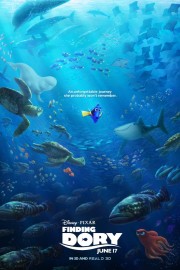Finding Dory
I’ve been quite wary of Pixar Animation delving deep into the realm of creating franchises. “Toy Story” ended up being a perfectly organic trilogy, and “Monsters University” was a perfectly fine prequel to “Monsters Inc.,” but what story could possible be told in the upcoming “Toy Story 4?” I understand that “Cars” made them billions in merchandising, but is there anything there from a storytelling perspective to not only justify a proposed third film, but also Disney continuing it with two “Planes” films? (That said, I cannot wait for Brad Bird to make “The Incredibles 2.”) “Finding Dory” felt very unnecessary and gratuitous as a sequel, partially as a reaction to the lack of success director Andrew Stanton had in live-action, and the money he lost for Disney, with 2012’s “John Carter” (which is actually quite good, by the way). At this point, though, we should have learned to trust Pixar, as they managed to deliver something truly special and genuine in their follow-up to the 2003 classic.
The brunt of the film takes place a year after Dory (once again played beautifully by Ellen DeGeneres) met Marlin (the incomparable Albert Brooks) as he was searching for his son, Nemo, in the vast ocean. She has settled in with the group that surrounds Marlin and Nemo and is off with Mr. Ray teaching the younger fish when she has a flash of memory of when she was younger, and her parents, Charlie (Eugene Levy) and Jenny (Diane Keaton). As determined as she’s ever been, she leads Nemo and Marlin on another trip across the ocean to find her family. Just off of the California coast, they get separated, with Dory taken to a Marine Life Center she remembers something of, and Marlin and Nemo are trying to play catch-up. Taken to quarantine, Dory meets up with an octopus named Hank (Ed O’Neill) who reluctantly helps her get where she needs to go, and along the way, the memories start coming back to her fast and furious as she has more that is familiar to her thrown her way.
Because of the fact that, like Nemo in the first one, she gets separated from Marlin and Nemo, the title is an obvious reference to their attempts to find Dory. But really, Marlin and Nemo are secondary players in this story (which is a shame, on one level), and the title is about finding out more about Dory than finding her in the traditional sense. The story by Stanton, who collaborated on the screenplay with Victoria Strouse, is primarily an emotional one, like the original, and when it centers on Dory, her short-term memory loss (which was very funny in “Nemo,” but is turned into something painfully sad here), the film cannot go wrong on a comedic or emotional level. If there’s one disappointing thing about “Dory,” it’s that we don’t spend a lot of time in the larger ocean before getting to the Center. We get to see the turtles again, which was nice, but one of the primary sources of suspense and tension in the first film was how Marlin and Dory had to survive sharks, a field of jellyfish, and other perils to complete their mission. Here, it’s a quick hop on the EAC to the coast of California and bam, we’re there. Granted, we get fun new characters such as Hank, Bailey (Ty Burrell), a beluga with a malfunctioning echolocator, Destiny (Kaitlin Olson), a nearsighted whale shark who was friends with Dory, and a pair of seals (Idris Elba and Dominic West) who have an obsession to keep one of their own off of their rock, but we also feel a lot of tension move out of the film by how it seems to rush towards it’s ending point, and meander there to build tension about Dory finding her parents. Usually, Pixar has a little more sense of purpose from a storytelling perspective.
That being said, you can’t derail Pixar when it comes to the emotional pull their best films have, and even if it doesn’t quite come up to the level of not only its predecessor, but the other best films in Pixar’s stable (“Inside Out,” “Up,” “Wall-E,” the “Toy Story” trilogy), in terms of storytelling quality (it’s almost pointless to bring up the animation with them, as you can always count on them delivering on that level), on an emotional level, it’s every bit as profound and devastating as their best. While watching “Nemo” 13 years ago, I never really thought, “Wow, I wonder what Dory’s backstory is,” but part of what makes Pixar so special is the way they give you the unexpected, and make it into something you remember. (Can we also say how quietly, going back to “Toy Story 2” with Jesse, Pixar has delivered some of the most unforgettable and complex female characters in modern film? Dory certainly belongs in that category.) They always seem to want to make sure the emotional stuff matters, which is part of why “Cars 2” felt like such a step back for them (Where is the emotion in a sequel that only exists to milk another billion in merchandising revenue?), and why “Toy Story 4” feels like such a risk, despite the enduring popularity of those characters. (How do you not undo the emotional satisfaction in that ending for audiences?) Continuations are a tricky business, but when they work (even if it’s only marginally, like “Monsters University”), they give us greater insight into the world, and the characters. On that level, it’s easy to put “Finding Dory” with the greatest moments in Pixar history.










